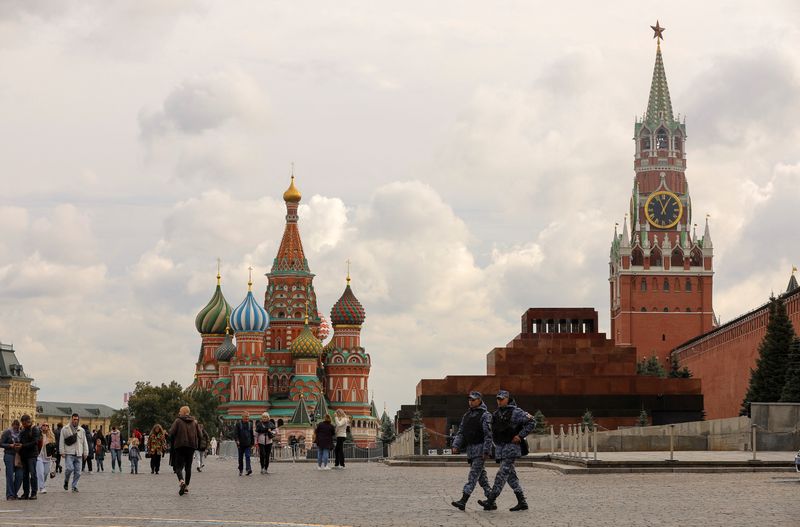By Darya Korsunskaya
(Reuters) - The cost of Russia's military mobilisation and the impact of Western sanctions are set to blow a hole in the government's budget forecasts and drain Moscow's reserves to their lowest level in years, according to analysts' latest calculations.
That will put an ever greater strain on the Kremlin's resources as President Vladimir Putin seeks to fund a conflict with no end in sight and prepares for a possible re-election bid in 2024.
After eight months of what it calls a "special military operation", Moscow has drawn up a 2023 budget that takes no account of the cost of the recent call-up of 300,000 reservists, the declared annexation of four Ukrainian regions - the Kremlin says the four joined Russia freely - and Western efforts to cap Russian energy export prices, analysts say.
While Russia's economy initially held up relatively well to the waves of Western sanctions imposed on it, the impact is beginning to show - in analysts' assessments, if not in those of the government.
"The macroeconomic forecast, upon which the budget is based, was calculated before mobilisation," said Alexandra Suslina, an independent analyst. "It does not take into account new sanctions, and therefore is not reflecting reality."
Putin's current, fourth term as a president expires in 2024 and he is yet to say if he will run again - a process that, judging by past campaigns, would likely involve courting voters with promises to spend more on wages, welfare and pensions.
Kremlin spokesman Dmitry Peskov told reporters on Wednesday that Putin had not yet decided whether to run in 2024 but added: "The social obligations of the state are an absolute priority."
Russian official forecasts estimate that GDP will fall 0.8% next year, while a Reuters poll of analysts sees the economy shrinking 2.5%. The World Bank expects a 3.6% contraction.
BALLOONING DEFICIT
Russia's finance ministry expects the budget deficit next year to almost double from this year to 3 trillion roubles, or 2% of gross domestic product. Analysts at state bank VTB forecast the gap at an even wider 4-4.5 trillion roubles.
Moscow sees energy revenues at 9 trillion roubles next year, or a third of its total income - a projection analysts say is also too optimistic amid upcoming sanctions on Russian energy imports by the west.
"The finance ministry forecasts incredible things such as that energy income ... would remain as before, like Russia would continue to produce the same amount of oil with demand unchanged," an economist at a western financial company said.
As Europe cuts ties with Russia, Moscow risks losing a staggering 55% of its oil product exports, or over 80 million tonnes, next year, the government has estimated. Gazprom (MCX:GAZP)'s gas exports already plunged 43% in January-October compared with the same period last year.
The finance ministry sees non-energy revenue, or that related to economic activity, at 11.5% of GDP in 2023, around 7% higher than this year and on par with pre-pandemic levels.
But analysts say that this, too, is hardly realistic.
"Consumer demand will be falling, people will be buying less, cheaper, lower in quality - and then the non-energy income forecast... will have to be revised," said Suslina.
While Russia this week officially ended what it calls its "partial" mobilisation, some 300,000 reservists called up by the Kremlin for its campaign in Ukraine since September remain in military units, which also hurts economic activity.
Lower economic activity and weak imports may see Moscow collecting around 1 trillion roubles less per year from value-added tax, its main non-energy income, according to a joint study by the Russian Presidential Academy Ranepa and the Gaidar Institute.
Dmitry Polevoy, investment director at Moscow-based broker Locko Invest, estimates that payouts to those mobilised - including higher-than-average salaries and compensation in the event of injury or death - may come to between 900 billion roubles and 3 trillion roubles in the next half-year alone.
The finance ministry did not reply to a Reuters request for a comment.
Finance minister Anton Siluanov, without giving details, told Russian lawmakers last week that the budget "allows (us) to meet all social obligations without harming macroeconomic stability."
LIMITED OPTIONS
Russia has few options for plugging the budget deficit, analysts say, as sanctions and counter-sanctions have hit foreign investors' ability to invest in domestic rouble bonds, and the finance ministry is already depleting the resources of the National Wealth Fund (NWF).
As Russia has actively started spending NWF money on everything from economic support to social payments, the finance ministry sees the fund halving to 6.25 trillion roubles, or 4.2% of GDP - its lowest since 2018 - by the end of next year.
"The main budget risk amid significant sanctions pressure... is of a complete dry-out of the NWF, which could significantly undermine the federal budget's stability and the budget system as a whole," analysts at the Financial University said in a recent note.
If it falls to 5.95 trillion roubles, or 3.7% of GDP, by the end of 2024, the amount of cash left would be the smallest Russia has had in its reserves in the last two decades, according to the budget comments by the state Audit Chamber.

"Sources to finance the budget deficit are now scarcer than ever," Suslina said.
"I very much hope that the finance ministry will avoid outright money printing."